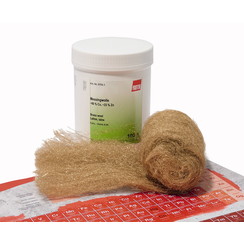You have no items in your shopping cart
Brass
Brass is an alloy of copper and zinc, in proportions which can be varied to achieve varying mechanical and electrical properties. It is a substitutional alloy: atoms of the two constituents may replace each other within the same crystal structure.
Brass is similar to bronze, another alloy containing copper, with tin in place of zinc; both bronze and brass may include small proportions of a range of other elements including arsenic, lead, phosphorus, aluminum, manganese, and silicon. The distinction between the two alloys is largely historical, and modern practice in museums and archaeology increasingly avoids both terms for historical objects in favor of the more general "copper alloy".
Brass has long been a popular material for decoration for its bright gold-like appearance, e.g. for drawer pulls and doorknobs. It has also been widely used for all sorts of utensils due to many properties, such as low melting point, workability (both with hand tools and with modern turning and milling machines), durability, electrical and thermal conductivity. It is still commonly used in applications where low friction and corrosion resistance is required, such as locks, hinges, gears, bearings, ammunition casings, zippers, plumbing, hose couplings, valves, and electrical plugs and sockets. It is used extensively for musical instruments such as horns and bells, and also used as substitute of copper in making costume jewelry, fashion jewelry and other imitation jewelry. The composition of brass, generally 66 percent copper and 34 percent zinc, makes it a favorable substitute for copper based jewelry as it exhibits greater resistance to corrosion. Brass is often used in situations in which it is important that sparks not be struck, such as in fittings and tools used near flammable or explosive materials.

